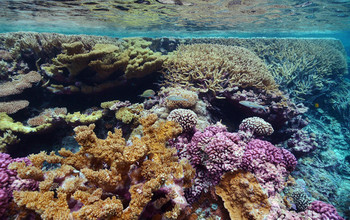Oceans may be acidifying faster today than in the past 300 million years
 Credit and Larger Version |
With increasing levels of carbon dioxide accumulating in the atmosphere and moving into marine ecosystems, the world's oceans are becoming more acidic.
The oceans may be acidifying faster today than at any time in the past 300 million years, scientists have found.
To address concerns for acidifying oceans, the National Science Foundation (NSF) has awarded new grants totaling $11.4 million through its Ocean Acidification program. The awards are supported by NSF's Directorates for Geosciences and Biological Sciences.
From tropical oceans to icy seas, the projects funded will foster research on the nature, extent and effects of ocean acidification on marine environments and organisms.
"The Ocean Acidification program at NSF has been wonderfully successful," says David Garrison, program director in NSF's Division of Ocean Sciences.
"We're seeing exciting results from earlier funding, and looking forward to similarly productive research from the current group of awardees."
Ocean acidification affects marine ecosystems, organisms' life histories, ocean food webs, and biogeochemical cycling, scientists have discovered.
Researchers believe there is a need to understand the chemistry of ocean acidification and its interplay with marine biochemical and physiological processes before Earth's seas become inhospitable to life as it is known today.
Animal species from pteropods--delicate, butterfly-like planktonic drifters--to hard corals are affected by ocean acidification. So, too, are the unseen microbes that fuel ocean productivity and influence the chemical functioning of ocean waters.
As the oceans become more acidic, the balance of molecules needed for shell-bearing organisms to manufacture shells and skeletons is altered.
The physiology of many marine species, from microbes to fish, may be affected. A myriad of chemical reactions and cycles are influenced by the pH, or acidity, of the oceans.
"Ocean acidification is an under-appreciated aspect of climate change, affecting the ecology of organisms and creating novel evolutionary pressures," says George Gilchrist, program director in NSF's Division of Environmental Biology.
"The integrated nature of these eco-evolutionary studies will provide new insights into how changes in ocean chemistry reshape populations and communities of marine organisms."
NSF Ocean Acidification grantees will ask such questions as: Will regional differences in marine chemistry and physics increase acidification? Are there complex interactions, cascades and bottlenecks that will emerge as the oceans acidify, and what are their ecosystem implications? And if current trends continue, how far-reaching will the changes be?
"This research on the physiological and metabolic responses of organisms to ocean acidification," says Irwin Forseth of NSF's Division of Integrative Organismal Systems, "is essential to our understanding of how these environmental changes will affect the structure and function of sensitive ecosystems worldwide."
The grants are part of NSF's Science, Engineering and Education for Sustainability (SEES) initiative.
NSF 2014 Ocean Acidification awardees, their institutions and projects are:
Marguerite Koch, Florida Atlantic University:
Robert Toonen, University of Hawaii:
Andreas Andersson, University of California, San Diego, Scripps Institute of Oceanography: Collaborative Research Ocean Acidification: Establishing the links between offshore biogeochemistry, coral reef metabolism and acidification
Rodney Johnson, Bermuda Institute of Ocean Sciences:
Timothy Bralower, Pennsylvania State University:
James Zachos, University of California, Santa Cruz:
Paul Falkowski, Rutgers University:
Zackary Johnson, Duke University:
Konstantinos Konstantinidis, Georgia Institute of Technology:
Jan Pechenik, Tufts University:
Anthony Pires, Dickinson College:
Andreas Schmittner, Oregon State University:
Robert Carpenter, University of California - Northridge:
Kevin Gross, North Carolina State University:
Eric Kaltenbacher, SRI International:
Robert Byrne, University of South Florida:
Giulio De Leo, Stanford University:
James Barry, Monterey Bay Aquarium Research Institute:
C. Brock Woodson, University of Georgia:
Scott Hamilton, San Jose State University:
Cheryl Logan, California State University - Monterey Bay:
Brian Tissot, Humboldt State University:
-NSF-
Media Contacts Cheryl Dybas, NSF, (703) 292-7734, cdybas@nsf.gov
NSF News: World Oceans Month Brings Mixed News for Oysters: http://www.nsf.gov/news/news_summ.jsp?cntn_id=128228
NSF News: Ocean Acidification Linked With Larval Oyster Failure in Hatcheries: http://www.nsf.gov/news/news_summ.jsp?cntn_id=123822
NSF Discovery: Trouble in Paradise: Ocean Acidification This Way Comes: http://www.nsf.gov/discoveries/disc_summ.jsp?cntn_id=122642
NSF News and Audioslideshow: On 'Earth Week,' World Is No Longer Our Oyster: http://www.nsf.gov/news/news_summ.jsp?cntn_id=116767
NSF News: Palau's coral reefs surprisingly resistant to ocean acidification: http://www.nsf.gov/news/news_summ.jsp?cntn_id=130129
NSF News: Ocean Acidification Changes Nitrogen Cycling in World Seas: http://www.nsf.gov/news/news_summ.jsp?cntn_id=118233
NSF News: Oceans Acidifying Faster Today Than in Past 300 Million Years: http://www.nsf.gov/news/news_summ.jsp?cntn_id=123324
The National Science Foundation (NSF) is an independent federal agency that supports fundamental research and education across all fields of science and engineering. In fiscal year (FY) 2014, its budget is $7.2 billion. NSF funds reach all 50 states through grants to nearly 2,000 colleges, universities and other institutions. Each year, NSF receives about 50,000 competitive requests for funding, and makes about 11,500 new funding awards. NSF also awards about $593 million in professional and service contracts yearly.
Useful NSF Web Sites:
NSF Home Page:
NSF Home Page:
http://www.nsf.gov
NSF News
NSF News
: http://www.nsf.gov/news/
For the News Media:
For the News Media:
http://www.nsf.gov/news/newsroom.jsp
Science and Engineering Statistics:
Science and Engineering Statistics:
http://www.nsf.gov/statistics/
Awards Searches:
Awards Searches:

Decreasing ocean pH (increasing acidity) threatens already vulnerable abalone populations.
Credit and Larger Version

Juvenile rockfish are susceptible to changing ocean pH: ocean acidification.
Credit and Larger Version

Tiny phytoplankton, shown here as light blue and green blooms, are at risk from ocean acidification.
Credit and Larger Version

Tropical algae may respond well to acidification, affecting coral reefs the algae may overgrow.
Credit and Larger Version

NSF ocean acidification grant awardees will develop compact new ocean instruments.
Credit and Larger Versión
The National Science Foundation (NSF)
Guillermo Gonzalo Sánchez Achutegui
ayabaca@gmail.com
ayabaca@hotmail.com
ayabaca@yahoo.com
Inscríbete en el Foro del blog y participa : A Vuelo De Un Quinde - El Foro!

No hay comentarios:
Publicar un comentario